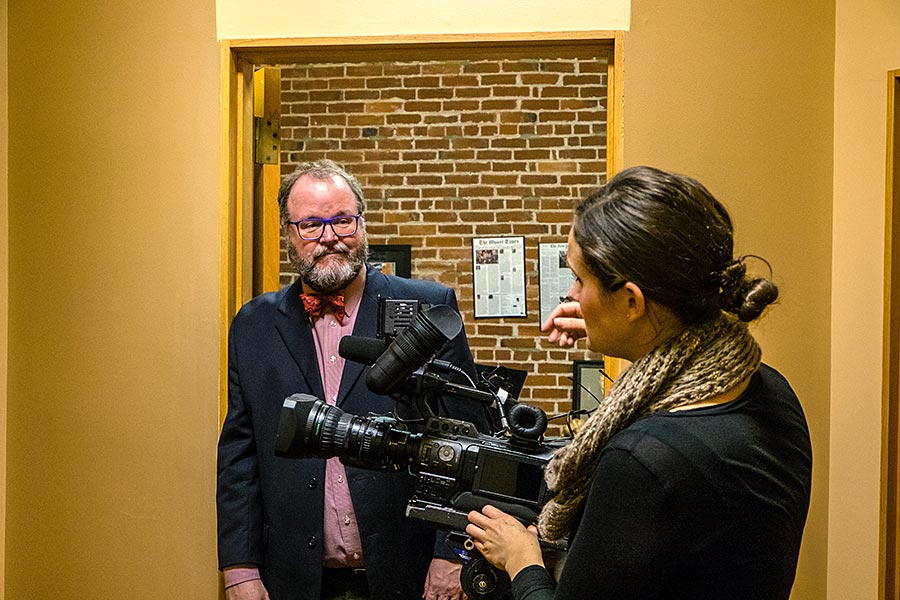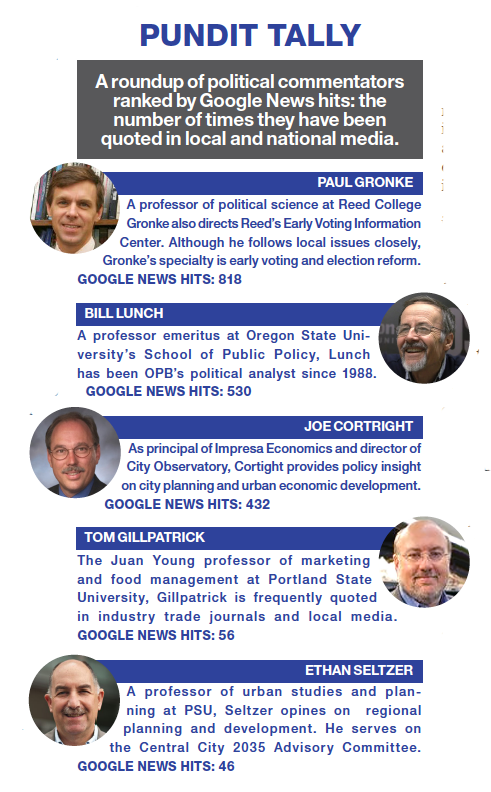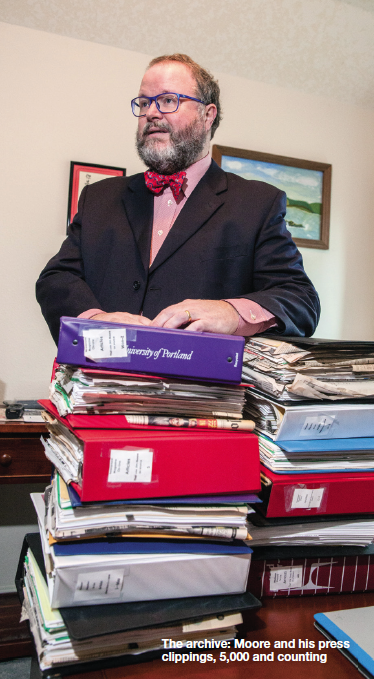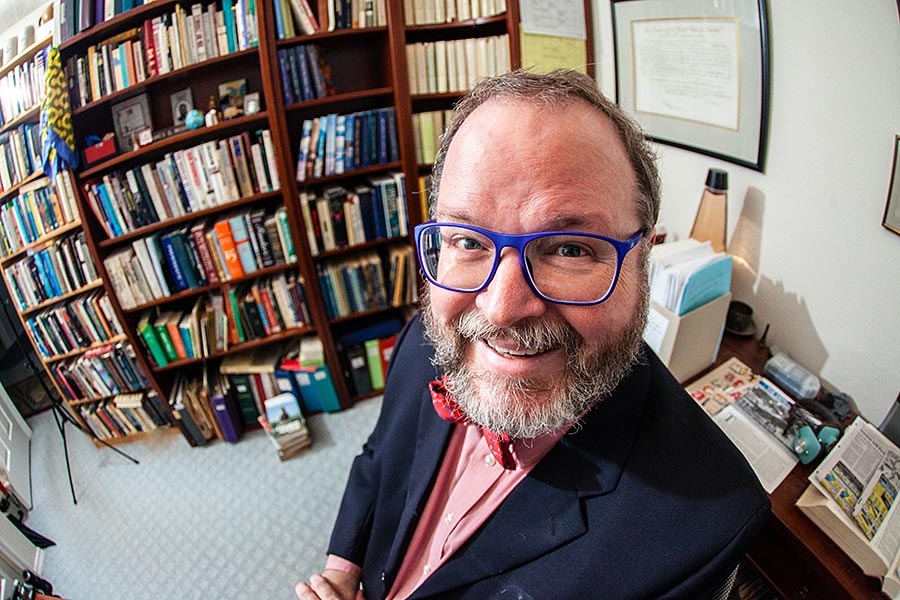How Jim Moore became the most quoted political analyst in Oregon.
You know Jim Moore. A fixture in Oregon media, the Pacific University professor is everywhere: radio, television, websites and newspapers, not to mention his Forest Grove lecture hall.
Between January 4 and November 1, 2016, Moore, 57, provided a quote, gave on-air analysis or lent his uncredited expertise to a journalist 246 times (Oregon Business reporters included).
Then things got really busy. During this last election season and its aftermath, Moore delivered analysis — and analysis of analysis gone wrong — at a grueling pace.
Through all the appearances and interviews, his party-agnostic brand of approachable commentary was evident. He sliced and diced difficult concepts, serving the bite-size morsels with a resonant voice, avuncular flair and signature bow tie.
“People tell me things don’t happen in politics for them unless I weigh in,” Moore says.
It’s a joke, of course. It may also be a chronicle of a death foretold.
The year 2016 saw political discourse dissolve into partisans screaming into echo chambers, facts become less important than the stew of misinformation circulated on social media and trusted, scientifically based polls fail hard.
Can Moore, the state’s civics instructor, survive in a hostile, polarized media environment, a world where the “comments section” wins elections?
The answer to that question is bigger than one man. The story of Moore is the story of today’s media-political industrial complex — its cracks, its fissures and the possibility of repair.
***
Moore has had a front seat view to the dance between politics and media since, well, birth. His parents graduated from the staff of the Daily Barometer, Oregon State’s newspaper, to running a small news station in Eureka, Calif. Moore’s earliest memories are of talking back to the talking heads, all family friends, on the news or appearing in the background, while his anchorman dad searched for Bigfoot on camera.
His fascination with politics started early as well. In 1972 the eighth grader, now living in Medford, left school with a friend to volunteer on election day.
“The Nixon headquarters turned us down, so we were poll watchers for McGovern,” he recalls. Two years later, his father ran for county commissioner, giving Moore a direct view inside a campaign. Senior year saw him teaching the mandatory civics class.
 On the Job: Moore giving an interview to KOIN news. | Photo by Jason Kaplan
On the Job: Moore giving an interview to KOIN news. | Photo by Jason Kaplan
Since then he’s lived in Vermont, where he voted for Bernie Sanders, and Monterey, Calif., where he cast a ballot for Clint Eastwood. He began his on-air commenting career in 1990 while teaching at the University of Portland, offering background on the gay community that supported Governor Barbara Roberts and opposed anti-gay measure 9.
“My department chair loved it, but he gave me grief for wearing a pink bow tie,” Moore remembers. Two years later he was calling elections live on air at KOIN.
Moore left UP to try his hand at full-time punditry in spring 2001. It turned out to be a good year for the man who is equally knowledgeable in both American and international politics; is an expert on terrorism; reads Italian, Spanish and French; and knows enough Arabic to offer deep and unique analysis of Osama bin Laden’s speeches.
Today journalists call on him before writing a story to unravel the complex knots of public policy, or to provide that killer, on-deadline quote.
“Moore is accessible, knowledgeable and willing to be quoted on a large range of subjects,” says Jeff Mapes, a senior political reporter for Oregon Public  Broadcasting.
Broadcasting.
After 32 years covering state and national politics for the Oregonian, Mapes watched as Moore became the go-to guy for analysis, surpassing Oregon State’s Bill Lunch, who is retired, and Reed College’s Paul Gronke, who is “more reticent on issues.”
Reticent Moore is not. He’s been interviewed approximately 5,600 times since 1991 and says he’s never at a loss for a quote. Clocking in at 6’2”, he is gifted with a comforting, big-boy physicality and commanding voice, both of which add gravity to his succinct, engaging commentary.
“My wife says even if I don’t know what I’m talking about it sounds like I do,” says Moore, who is so comfortable and camera ready that he brings an earpiece — his second after the first wore out — to engagements.
On a pre-election October afternoon, he moved confidently between his worlds: leading 14 Pacific students through their parties and elections class, charming an auditorium of 300 on a four-person panel discussion about elections at Washington State University’s Vancouver campus and then back to Portland’s KOIN television station, where he answered questions in real time for a live Facebook stream before taping a Q&A session for future broadcasts.
“Jim has institutional knowledge, offers historical context and is a lively guy,” observes Gordon Friedman, a reporter at the Statesman Journal who covers state government. Friedman admits the topic is “not sexy” and says his readers count on Moore’s analysis and perspective.
So, is Moore’s earlier assessment — that things don’t happen in Oregon politics until he weighs in — true? “Things are a story either way,” answers Friedman, “but it might be a boring story without Jim.”
Moore’s showmanship is certainly evident no matter the venue. Witness the October 25th Facebook Live session at KOIN.
Although it eventually reached over 3,000 viewers, only 75 logged on the night it streamed. As that number dwindled to 22, one felt deep sympathy for the producer tasked with sifting through the stream of ridiculous comments for anything — anything at all — that could be distilled into an intelligent question. Moore and KOIN anchor Jennifer Hoff mostly stuck to an expected script of topics, measure 97 — Oregon’s tight Secretary of State race, Clinton versus Trump — for the half-hour segment.
Until one commenter suggested that Moore’s bow tie was a clip-on.
The professor looked at the camera with a wry smile, untied the bow with a flick of his wrist and retied a perfect knot before moving to the topic of third-party candidates.
***
Pacific University welcomes and encourages this kind of engagement — and entertainment. Moore’s opinion that his punditry is nothing more than teaching to the larger community meshes well with Pacific’s mission of reaching out beyond the campus, says Joe Lang, Pacific’s director of media relations. The university has even asked Moore to coach other faculty on the finer points of engaging with the media.
“He’s a tremendous ambassador for our political science department and the university,” Long says.
Not all academic institutions are enthusiastic about faculty spending so much time dispensing information to the masses.
Indeed, if Moore’s press file is an achievement, it’s one that carries less weight with his publish-or-perish-focused peers at larger, more prestigious colleges. When Friedman approached the University of Oregon’s political science department for comments or analysis, the professors there sent him to Moore. “They said ‘Jim’s the expert.’”
“The more important the university, the less this kind of work is good for your career,” says Moore, specifically referencing the University of Oregon and the University of Washington.
It’s created professional challenges for Moore. He finds himself arguing with peers that what he does is scholarship, noting that he keeps up with all of the literature, reads three newspapers a day (The New York Times, London’s Financial Times and the Oregonian) and checks in with European papers and news magazines weekly. He says he no longer attends academic conferences.
“Big schools want you to publish or perish. You have to write an article and a book a year to get tenure,” he says. Moore calls that model “awful. It doesn’t engage in the real world. I argue that when I talk to the New York Times, I just outdid any university peer review by 15 times.”
The tension between Moore and the academy at large may also reflect what many agree is a widening gap between “elites,” academics included, and everyone else.
That said, Moore is not the only Oregon professor on the media’s speed dial. It’s a time-honored practice for journalists to call on academics for an expert opinion; reporters also serve as a liaison between universities and the citizenry, translating wonky institutional research into readable prose.
Reed professor Paul Gronke, who specializes in early voting and vote by mail, bristles at the notion that he is reticent to talk to the press. “I’m quoted in national outlets hundreds if not thousands of times during the campaign season,” he says via email.
Kevin Myers, Reed’s director of communications, explains further. “Paul is willing to talk about early voting, absentee voting or the mechanics of elections,” he says. “In coarse terms, it’s about protecting the brand.”
Central to Moore’s brand strategy is his open-door policy. He hands out his home phone number without blinking. The only rule? Calling hours are from 6 to 9. That’s 6 a.m. to 9 pm. Availability like that keeps him popular.
“It’s the path of least resistance,” theorizes Joe Cortright, president and principal economist of Impresa and another oft-quoted touchstone in Oregon’s media landscape. “One of the qualifications to getting quoted is being quoted.”
Cortright himself has watched as the dissemination of information move from the months-long white paper model to the faster, more direct, more interactive daily blog. To be sure, he still researches and publishes reports for anyone to see, but he calls his daily posts more proactive, more widely read and more useful.
“The white paper isn’t well adapted to the way people receive, process and act on information,” he says. (Cortright is an occasional Oregon Business columnist).
***
Moore and his wife, a school psychologist for the Hillsboro district, live in unincorporated Washington County. He hosts the media there often, showing off keepsakes from his travels and his paper-and-book cluttered office before sitting down in the camera-ready living room.
The location proved handy when an NPR reporter showed up looking for analysis on Metro’s urban growth boundary. Moore walked the reporter three houses down to show off the acres of rolling fields that abut his suburban subdivision.
National news comes calling when they want to do a Portland story or when something big happens — think Bob Packwood’s resignation, or the legalization of assisted suicide. But for the most part Moore’s analysis, like politics itself, is local. He says that the freelance-pundit business was good in the aftermath of 9/11, but admits that he doesn’t have enough of the entrepreneurial spirit to risk the guaranteed income that comes with teaching.
Not that Moore’s brand of neutral, data-driven analysis is a big money maker anyway. The rich paydays, he counters, are elsewhere. “Now, if I want to make a living at this, I’ll need to pick a political side and go to work for one of the cable shouting networks,” he says. “That’s not in the cards.”
Moore will talk to newspaper journalists for free but has found a way to monetize his radio and television appearances. “They pay me for exclusivity,” he reveals. This last election cycle saw him under a two-week contract with KOIN. He has a 15-year relationship with right-leaning radio station KXL, which keeps him off of other AM/FM stations but allows him to appear on OPB.
Over the years he’s seen the media landscape, and his compensation structure, change dramatically. In its heyday of the mid-1990s to the late 2000s, Moore had long-term contracts with KOIN, KPDX, KPTV, KATU and then KOIN again. Pay was per appearance and a flat fee for election night.
Management changes and tighter budgets shrank that to election period coverage only. The change in radio was more dramatic; a guaranteed monthly check deteriorated to “in-kind payment” of restaurant coupons and the like before bouncing back to per-appearance payments.
The last two years have been a loss for his punditry business. This year he’s in the black aga in, estimating that the fees he receives represent about 5% of his total income. “The money is nice to go out to dinner or to plop into my savings account for travel,” he says. “The most important thing, however, is teaching to that wider audience.”
***
But is that wider audience listening? In a post-truth, click-bait world, facts and “reality” matter less than appeals to emotion and personal belief, and political polls — the stock and trade of a psephologist like Moore — failed hard this year. Moore himself confidently predicted that Clinton would win the electoral college handily. Did this misstep hurt his value?
“There’s been no big hit to the brand at all,” Moore counters. The days after November’s election saw him talking and teaching locally about how and why the polls went wrong. He spoke to i24news, an Israeli news station, and The Economist as well.
“They want me to call it like I see it, not be a partisan hack,” Moore says. His lack of bias is proven, he claims, by the particular Republicans and Democrats who don’t want him to speak to groups because he’s “too biased. That tells me I’m doing it just about right.”
Vic Atiyeh, for one, clearly agreed. As Oregon’s latest Republican governor (“he never wanted to be called the ‘last Republican governor,’” according to Moore), Atiyeh built bridges across party lines. He must have seen a kindred spirit in Moore when he asked him to write his biography in 2013.
“He was aware of my analysis for years. He saw it all over the place,” Moore says.
Atiyeh donated his archives to Pacific, a move that surprised everybody considering the governor graduated from the University of Oregon. Another surprise came with the high-touch transfer of knowledge. Instead of following the usual protocol of loading a moving truck with documents and shipping them to the school, Atiyeh insisted that Moore personally come by with the archivists.
“He said, ‘I’ll give you a box and tell you a story,’” Moore remembers.
And Moore will tell that story to the rest of us. His book, to be published in 2017 by OSU Press, fits neatly into his narrative. (It is tentatively titled A lot Tougher Than You Made it Look — a moniker taken from a Neil Goldschmidt staffer comment about being governor about six months after Atiyeh left office.) Moore is Oregon’s non-partisan, nonelitist guide through the tangle of policy and politics.
Sure, he’s a showman who hits his mark, even after a stumble, but he’s also knowledgeable, insightful and in a world of ever-declining civics knowledge, entirely necessary. Moore’s been the people’s pundit for years, managing to hold the title as the media shrank, polarized and paid him in meal tickets.
The media game may change yet again as postelection brought a massive boom in newspaper subscriptions. But Moore insists his approach will stay the same.
“If my neutrality causes me to be shunted aside, it’s been a good run. I don’t think I’ll be pushed aside for the foreseeable future.” In fact, a November 20th article in The Columbian might contain his pithiest quote yet.
When opinion page editor Greg Jayne asked him for insight on what happened in the presidential election, Moore had the perfect quote. “Trump won.”
A version of this article appears in the January 2017 issue of Oregon Business.




